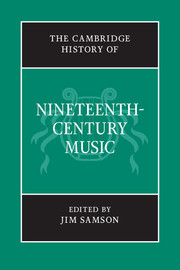Book contents
- Frontmatter
- Part One 1800–1850
- 1 The musical work and nineteenth-century history
- 2 Music And the rise of aesthetics
- 3 The profession of music
- 4 The opera industry
- 5 The construction of Beethoven
- 6 Music and the poetic
- 7 The invention of tradition
- 8 Choral music
- 9 The consumption of music
- 10 The great composer
- Part Two 1850–1900
- Chronology
- Institutions
- Personalia
- Index
- References
5 - The construction of Beethoven
from Part One - 1800–1850
Published online by Cambridge University Press: 28 March 2008
- Frontmatter
- Part One 1800–1850
- 1 The musical work and nineteenth-century history
- 2 Music And the rise of aesthetics
- 3 The profession of music
- 4 The opera industry
- 5 The construction of Beethoven
- 6 Music and the poetic
- 7 The invention of tradition
- 8 Choral music
- 9 The consumption of music
- 10 The great composer
- Part Two 1850–1900
- Chronology
- Institutions
- Personalia
- Index
- References
Summary
Beethoven vs. ‘Beethoven’
On 28 May 1810, a young woman wrote to the German poet Johann Wolfgang von Goethe describing her new acquaintance, Ludwig van Beethoven:
When I saw him of whom I shall now speak to you, I forgot the whole world … It is Beethoven of whom I now wish to tell you … but I am not mistaken when I say – what no one, perhaps, now understands and believes – he stalks far ahead of the culture of mankind. Shall we ever overtake him? – I doubt it, but grant that he may live until the mighty and exalted enigma lying in his soul is fully developed, may reach its loftiest goal, then surely he will place the key to his heavenly knowledge in our hands so that we may be advanced another step towards true happiness.
…I may confess I believe in a divine magic which is the essence of intellectual life. This magic Beethoven practises in his art. Everything that he can tell you about is pure magic, every posture is the organization of a higher existence, and therefore Beethoven feels himself to be the founder of a new sensuous basis in the intellectual life … Who could replace this mind for us? From whom could we expect so much? All human activities toss around him like mechanism, he alone begets independently in himself the unsuspected, uncreated. What to him is intercourse with the world – to him who is at his sacred daily task before sunrise and who after sunset scarcely looks about him, who forgets sustenance for his body and who is carried in a trice, by the stream of his enthusiasm, past the shores of work-a-day things?
- Type
- Chapter
- Information
- The Cambridge History of Nineteenth-Century Music , pp. 118 - 150Publisher: Cambridge University PressPrint publication year: 2001
References
- 3
- Cited by

